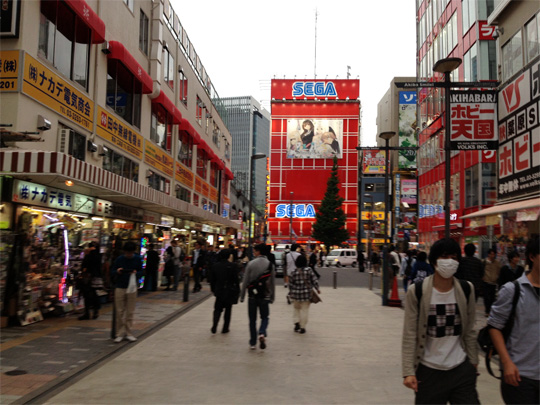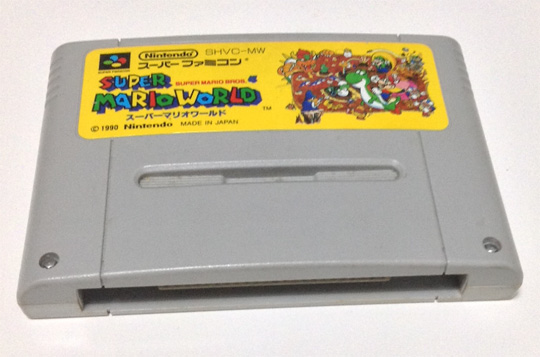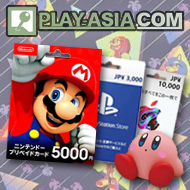Hunting for “junk” games in Akihabara.
An introduction: I moved to Tokyo in July of last year and other than being in love with the country of Japan, it lets me sometimes indulge in my nerdier instincts. When I first moved to Tokyo, I made a point out of coming to Akihabara. It is definitely the nerd capital of the world. Akihabara is actually smaller than you think it is – it is a several block radius surrounding Chuo-dori, a main street in the Chiyoda city district, and just down the street from Ueno – but there’s a lot packed into it.
Something that I do often is trawl the video game stores of Akihabara for their cheapest titles, often called “junk games,” because there’s a reasonable chance the games might not work — and for anyone who remembers the glory days of Funcoland and GameStop, these are usually cartridge based games with no box, no instructions, and often with stickers or some other kind of indication that someone at some point owned it. In Japan, that often means finding a Super Famicom game with some kid’s name on it, and there’s a high chance that he probably works at a company somewhere having long forgotten about the game that he used to play. In addition to Super Famicom, the most common junk games include titles playable on Famicom (original NES), Mega Drive (Sega Genesis), PC Engine (TurboGrafx-16 or Duo), Game Boy, GB Advance, and DS. Of course, super old PlayStation and Sega Saturn titles abound as well, some Dreamcast games, and in some places, you’ll even find WonderSwan, 3DO, Neo-Geo, and Atari Jaguar games. There are lots of non-junk games without instructions or boxes as well, some of them even the same games but marked up much more considerably, but I’ll be focusing on the junk games here.
Most of the time in the junk games section, they really are junk; copies of horse racing games, substandard baseball games, soccer games, or really obscure RPGs that only deep hardcore nerds have ever played litter the bins. They are usually around 100 yen, making the risk minimal, and if you end up finding a gem that works, it makes the search worth it. Of course, you also run into the risk that the games plain don’t work, which is a fair assumption because most of the cartridge games are over 20 years old at this point, and it’s reasonable to assume that age has taken its toll. Even then, a good cleaning of the contacts with rubbing alcohol and a cotton swab usually gets them up and running again, though in Japan, rubbing alcohol is weirdly expensive and not easy to find compared to America where a large bottle will usually run you a buck. I’ve needed to do that twice; once for a copy of Fatal Fury for the Super Famicom –which is a bad port, so don’t buy it—and once for Super Mario World, which of course, you should already own if you don’t already.
However, if you do find any interesting rarities, you’d better snap them up quick. What may be there one day won’t be there the next. There are maybe a thousand other game hunters looking for the exact thing and they are not in Japan to hesitate on some gem.
There are lots of places where you can hunt for used games. The largest chain is Book-Off; this is a general media second hand store that often has some surprising things in their bins, but it’s a difficult place to shop and the main Akiba store’s junk bin is located next to their AKB48 section, and given the fanbase of that obscenely large JPop group, you might have to do some bobbing and weaving to do any looking. (Protip: if you don’t know any Japanese, the most handy word you can learn is sumimasen, which means both “excuse me” and “I’m sorry.”) Super Potato is the legendary one, the one all nerds lust over, but their junk bin is limited and often doesn’t have anything interesting, though I did get a Minimoni party game there. Trader has many, many locations throughout Tokyo –and even three locations down Chuo-dori– but you have to be careful, because if you go up too many stairs, you’ll find yourself wading in porn. That aside, Trader has an outstanding selection and usually has some of the more obscure titles in fairly good condition – and plenty of new copies of recently released Dreamcast games! One I like is Retro Game Camp, but it’s very small, very cramped, and their junk bins are usually outside, exposed to the elements. Sofmap is also very large, but their junk bins so big, going through them is too much of a chore, and again, going up too many levels smacks you straight into porn. Mulan and Lammtarra are two others I’ll briefly mention, but I don’t really recommend those places to anyone but the brave, as Mulan’s junk bin is also outside and exposed to the elements, and Lammtarra specializes in porn and JPop idol memorabilia, so unless that’s a thing you’re specifically into, you can skip it entirely.
Two places you shouldn’t look for used games are Yodobashi Camera and Don Quijote. Yodobashi is a wonderful place but it doesn’t sell used games, and Don Quijote, a discount goods store with an AKB48 theater on its top floor in the Akiba location and three floors with some amazing arcade games , has a forgettable section not worth browsing. You should totally visit those places anyway, though.
If you need older consoles to play the games, I recommend either Super Potato, Retro Game Camp, or Trader2 (there are four Traders in Akiba, but Trader2 has the best selection and largest store, located a few meters away from the Belle Salle building). I bought my PC Engine at Super Potato, but they have a bunch of semi-obscure consoles and loads of the usual suspects, including a bunch of Neo-Geo CD consoles and even an MSX or two. Retro Game Camp comes close, and I’ve even seen a Mega Drive in its original, Sega Master System style box. Trader2 also has a good selection, and also has a hilariously large selection of original Xbox consoles – if that’s any indication how poorly the original Xbox did in Japan. They also have Retron-style emulator consoles and handhelds.
Sometimes these stores are intimidating to shop; the aisles are small compared to American shops, there can sometimes be a lot of people coming through at any given time, and in the case of cartridges, there’s a lot of fishing and guessing unless you already know what you’re looking for. But picking up Philosoma, the entire Ridge Racer series on PlayStation, or Super Fire Pro Wrestling Queen’s Special for 100 yen? Totally worth the effort.























